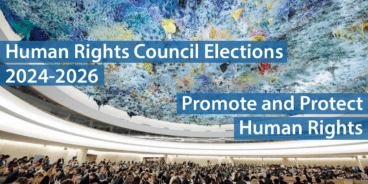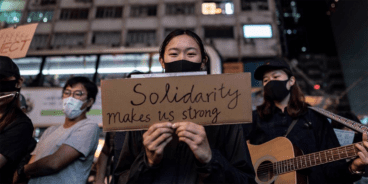
East Timor and Me: A Response to Noam Chomsky
The following article written by Prof. the Hon. Gareth Evans was originally published in The Interpreter, Lowy Institute for International Policy, in response to comments by Noam Chomsky on criticizing Evans’ handling, as Australia’s Foreign Minister from 1988-96, of relations with Indonesia over East Timor.
Noam Chomsky, in Sydney on 2 November, repeated his familiar attack on my handling, as Australia’s Foreign Minister from 1988-96, of relations with Indonesia over East Timor. It is one that he, along with his fellow Sydney Peace Prize recipient John Pilger, has been making now over many years in many different forums around the world.
I have learned from long experience that Professor Chomsky is not especially responsive to moderate and reasoned argument (as, for example, when he opposed me in a head-to-head debate in the UN General Assembly in 2009 on the ‘responsibility to protect’ doctrine I have championed, which he continues, including in his Sydney lecture, to misdescribe, notwithstanding its central role now in the international response to mass atrocity crimes).
But perhaps I can restate for the record (in the following extracts from a longer piece I wrote in September 1999, Indonesia and East Timor: Looking Back and Looking Forward) just why I, and the Labor Government I represented, acted as we did on this extraordinarily difficult and harrowing issue, and why our actions at no stage constituted either ‘robbery’ nor any kind of betrayal of the people of East Timor:
***
Successive Australian Governments certainly pursued good relations with Indonesia. That was obviously true of those of Hawke and Keating all the years I was Foreign Minister. But we didn’t pursue “Good Relations” as a policy end in itself. It was rather a means to multiple other ends, both realistic and idealistic in character. Ends like protecting our security. Advancing our prosperity. Solving problems like Cambodia, where Indonesia’s regional leadership mattered. Helping the fourth-biggest country in the world, and the biggest Islamic country, manage its own social, economic and political transformations. And, not least, helping the people of East Timor.
Clearly not all these objectives, particularly the last, were fully realised. Part of the reason is that Labor and Coalition Governments both made some mistakes, the biggest probably being our congenitally overoptimistic belief in the Indonesian military’s capacity for redemption. But when things went wrong it was overwhelmingly for reasons beyond our capacity to influence. Understanding past mistakes is the key to not repeating them. But when identifying Australian candidates for the rack, or self-flagellation, it is important to separate fact from fiction and to understand just what it was possible, and not possible, for Australia to achieve at each step along the way.
First, Australia was in no position militarily to stop or reverse Indonesia’s invasion of East Timor in 1975, any more than we could by ourselves have moved in against Indonesia’s will to stop the carnage in 1999. There is still an argument as to whether the then Labor Government could have done more to discourage Suharto. While the record is absolutely clear that Whitlam was firm and unambiguous throughout in opposing Indonesian military action, additional diplomatic representations could and should have been made after Portugal abandoned the territory in August. But there is no reason to suppose they would have made any practical difference: Suharto, and even more his generals, knew all too well that the international mood of the time was absolutely against involvement in another Asian imbroglio.
Second, there was nothing morally offensive about the Coalition Government’s decision in 1979, later endorsed by Labor, to extend de jure recognition of Indonesian sovereignty over East Timor – a decision triggered by the need to advance the Timor Gap international boundary negotiations. The critical point (which used to make Ali Alatas enormously irritated with me whenever I made it – which I did long before the 1998 ALP Conference resolution) is that Australia continued to recognise East Timor as a non-self-governing territory entitled to selfdetermination. This was its status under Portuguese sovereignty and continued to be the case under Indonesian sovereignty.
Two other legal/moral points just for the record. Australia was not the only country to give de jure recognition: thirty-one other countries did the same expressly or by implication. And East Timor was never disadvantaged by the Timor Gap treaty: in the event that it became independent, the new country was always going to inherit Indonesia’s revenue rights under it. When the oil and gas flows, the new Dili Government won’t be missing out on any royalties.
Thirdly, before the economic crisis of 1997 and its political aftermath changed everything, we all had to live with the fact that there seemed no realistic chance of Indonesia ever agreeing to a fully fledged act of self-determination in which independence was an option. Hindsight vision is always 20-20, but the most that then seemed achievable – and East Timorese leaders with whom I discussed this at the time didn’t disagree – was significant political autonomy, combined with a massive wind-back of the Indonesian military presence, and other measures of cultural recognition and development assistance.
As Foreign Minister, my persistence in pursuing this package and related human rights issues again regularly irritated my Indonesian counterpart (not least when I was praised on ABC radio in December 1995 by Jose Ramos Horta after some of my unpublicised UN efforts came to light). Such an autonomy package in fact seemed imminent on several occasions, never more so than in 1994 – until a well-intentioned statement from President Bill Clinton in Jakarta designed to pressure Suharto into acceptance produced, as this kind of diplomacy sometimes does, precisely the opposite result.
Fourthly, after 1997 the impossible suddenly seemed possible. It had nothing to do with the change of government in Canberra. Rather, the economic crisis saw Indonesia coming under international pressure as never before and desperate to garner international support. That and Suharto’s downfall opened up brand-new options for the resolution of the East Timor situation. John Howard correctly called one of them when he wrote to President B.J. Habibie in December 1998, urging Indonesia to grant East Timor significant autonomy immediately and to hold out the possibility of a full self-determination ballot at an unspecified later time.
The trouble was that Habibie’s response – inspired more by pique than high principle, and insufficiently canvassed with his military – went a quantum leap further than Howard had proposed, by throwing open the prospect of independence if autonomy were refused. It was at this point that alarm bells should have jangled for Howard and Alexander Downer: East Timorese leader Xanana Gusmao, in a December 1998 statement later echoed by Ramos Horta and bishop of Dili Carlos Belo, had called for up to a decade of autonomy before a referendum on independence was held. The East Timorese leaders knew all too well the potential for catastrophic violence if things were rushed. But the genie was now out of the bottle and no one in Australia raced to stuff it back in. The Government’s only scramble was for credit, with the Prime Minister happily claiming – right up until the post-ballot carnage – that he had been the architect of East Timor’s independence.
***
The position I took throughout my period in office, from 1988 to 1996, was that our quarrel in East Timor was with the Indonesian military, not its government or people. This was essentially the position I had taken eight years earlier in response to the Dili massacre, when I did very strongly condemn the local military’s horrific actions, but described them, on the evidence available to me, as ‘an aberration, not an act of state policy’. And it was language I used again in my 1999 piece:
The condemnation being heaped on the military for its appalling behaviour in East Timor – whether directed, tolerated or unable to be controlled from the top – is abundantly deserved. Our efforts over the years to help train and professionalise the military officer caste – which I supported and defended – have conspicuously failed and it is right for us and the world to break off relations with the military until a sea-change occurs and to pursue war crimes allegations wherever they lead. But we should not blame the whole country for the misbehaviour of its soldiers: disgust with the military is now enormously widespread in Indonesia itself, especially since the shooting of students in Jakarta last year, and its role and influence is eroding. The present civilian government has not covered itself in glory – either in the cynicism with which it initiated the East Timorese ballot or in its talking down the military’s role subsequently – but it hasn’t been the major villain any more than the people have been. To burn Indonesian flags, picket their embassies, ban Garuda, boycott Bali and cancel aid are all understandable reactions, but all they do is feed the chauvinist nationalist sentiment on which military hardliners thrive, and make even harder the democratic transformation now struggling to take wing.
***
That democratic transformation has now taken place, and all this is now history. The whole post1975 East Timor story needs to be told more fully than it has by anyone so far, including me, not least the extent to which during the Suharto years Australia was on common ground with East Timor’s exiled representatives (and had real support in Jakarta from figures like Ali Alatas) in seeking real autonomy for, and an end to military repression of, the territory. Plenty of misjudgments were made, and there is plenty of blame to go around. But Chomsky’s lurid characterizations don’t even begin to get it right.
Related Content


Revitalizing the Struggle for Human Rights
